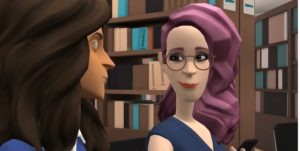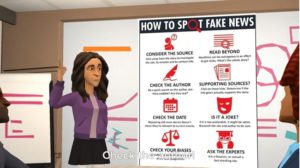‘Maddie is Online’: teaching information literacy and digital skills to schoolchildren via animation
Category: Blog
This is a blog post about ‘Maddie is Online’, a free educational resource that has been developed by Dr Konstantina Martzoukou.
Dr Konstantina Martzoukou, Teaching Excellence Fellow at Robert Gordon University in Aberdeen, has developed an online cartoon video series for schoolchildren (9-12 years old) to illustrate the dangers of online bullying and teach online information evaluation through animation. ‘Maddie is Online’ #maddiesonline is a free educational resource, which narrates the everyday life story of Maddie, a fictitious 10-year-old girl, who goes through some troubles while connected online.
The videos are available via the following links:
Series 1 Online Resilience: (8 episodes) (duration 17min 76 sec).
Reflections on social media and cyberbullying: (4min 11sec).
Series 2 Misinformation: (11 episodes) (duration 1hr 11 min).
The series was started to explore issues surrounding young children’s development of digital literacy as the online citizens of tomorrow. Young people are growing up online with a range of new social technologies but still need to master the guiding principles of online society and develop resilience in the online environment. Teachers, librarians and parents can play an important role in supporting children within the everyday life context to become digital citizens: informed, active, ethical, safe and responsible members of the online society.
In order to engage younger children in these issues, it is important to offer learning opportunities, which are interesting and relate to their everyday life online experiences. Previous research has found that there are diverse challenges and opportunities created in the online everyday life context as children (as young as 5 years old) are now using a wide range of social media enabled online tools for messaging, video sharing and online gaming to connect with others, learn and experiment. There are different educational material available for young children and their families, which could be highly valuable for educating young children. A few examples include:
- Ofcom has developed ParentPort with a range of guides for parents.
- The Digizen website provides information for educators, parents, carers, and young people to become responsible digital citizens.
- Childnet International has developed a parent/child agreement template that can be used by families to discuss issues related to children’s connectivity
- The Digital Resistance project promotes digital citizenship through inquiry-based learning methods and peer-education.
However, it was felt that there was a need to create more engaging and creative learning resources for children. Plotagon animation software is an educational creative tool that can be employed within the classroom and the home setting for the purposes of educating young children as digital citizens in a playful and engaging way. Using cartoon story-lines has been highlighted in previous research as an authentic pedagogical tool that can be used for diverse educational purposes, and as a method for attracting the attention of young people, stimulating critical thinking and discussion. As part of the series, Dr Martzoukou used real voice actors and created scenarios within a school environment to create a more realistic and believable story.
Series 1 asks children to choose the best scenario for dealing with issues of online resilience on social media and series 2 features a plot with Miss Mason, the new Computer Class Assistant, complete with a visit to a library setting, where Maddie meets ‘The Top Class Librarian (Series 2, Episode 5) and learns more about information evaluation.
Image 1. Maddie meets with the Top Class Librarian
The story line of series 2 presents the importance of evaluation criteria such as currency, authority, point of view, and highlights IFLA’s ‘How to spot fake news’ infographic (Series 2, Episode 10).
Image 2. Maddie presents IFLA’s ‘How to Spot Fake News’
Dr Martzoukou is looking to partner with schools and libraries to pilot the cartoon videos. Please get in touch with her directly at k.martzoukou@rgu.ac.uk if you are interested to test the videos out in your school with a brief evaluation questionnaire that can be done online.


